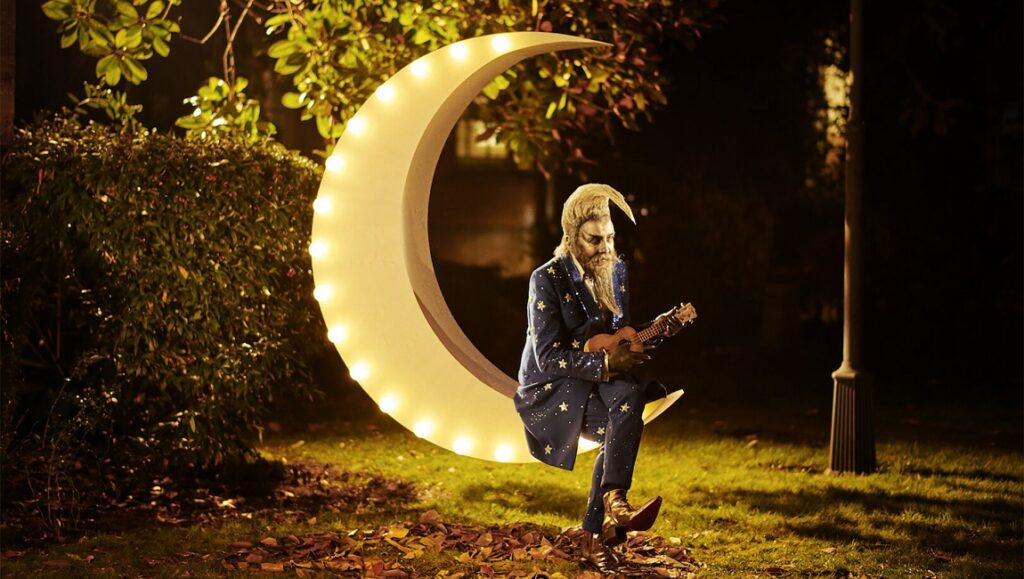The Show is an imperfect beast, but it’s beautiful and horrifying in a way only Alan Moore can concoct.
Northampton has always been a strange place. Historically, the town has a habit of being on the losing side of every conflict, and between civil wars, fires, and government neglect, it’s the sort of place the world tends to kick while it’s still down. Located in the very heart of the country, it’s a town that almost every person in England will have to pass through at some point, though few ever want to stay for long. Something like the Derry, Maine of England, it’s a strange place that often breeds strange people, prone to tragedy, bad luck, and, unlike King’s horror locale, radical political thought. To quote one of the characters in The Show, it “feels like we’ve been on somebody’s shit-list since the Normans.” So, when people are told that one of the biggest names in comic book history, the legendary Alan Moore, still lives in this small, oft-forgotten town, it’s difficult to see the enchantment the writer finds in such a place. The Show, a surreal urban fantasy/noir hybrid just as odd as the town it is set in, is Moore’s attempt to put his money where his mouth is, utilizing all the bizarre history and disquieting energy the place has to offer in one of his trademark adventures into the nightmarish.
Directed by Mitch Jenkins (who previously collaborated with Moore on Show Pieces), the film follows Fletcher Dennis (Tom Burke), a hitman (or “exit technician,” as he prefers to be called) who tracks his target to Northampton, where he finds the man already dead in a coincidental nightclub accident. Still on the tail of a stolen necklace the man had in his possession, Fletcher turns detective, but as his investigation becomes ever more elaborate, the lines between reality and fantasy start to blur, and he finds there is more to this small town than meets the eye. From start to finish, there is no better description of The Show than that it came from the mind of Alan Moore — from the Kafkaesque night court and the surreal cabaret of “The Show” to a Caligari-inspired hospital porter and a keyboard vigilante in superhero garb, every aspect of the film is so entirely Moorish. The author seems to throw every fragment of his imagination at the wall here, and, perhaps predictably, not everything sticks. His considerable supporting cast range wildly, from the enthralling to the annoying, and the film has a homegrown, at times even low-rent feel to it that is only further emphasized by the regional theater spirit of some of the performances. Moore’s trademark verbosity has always fit oddly in the mouths of others, and only a handful of the supporting cast (particularly the hilarious child noir detectives and Sheila Atim, whose performance as an occult mob boss is one of the most memorable in the film) can pull it off with any degree of style. Others are left to flounder in Moore’s wake, with gimmicky character quirks that sadly surpass performers’ handle on the material.
Still, Moore’s refusal to concede to anything even slightly conventional speaks to the greatest strength of The Show — its singular, bold, committed vision. As with any of Moore’s work, it’s bound to be divisive, even if it’s far from his most controversial work, and plenty of viewers will be keen to dismiss it out of hand as pretentious, bizarre drivel. Indeed, I can’t even say it’s not that — it’s hard to leave The Show certain of anything you’ve just seen, other than that it’s at times quite beautiful and at times quite horrifying. What is certain, however, is that Moore’s attempt to visually explore the beloved town he has written so much about and defended so ardently results in a film that, as imperfect as it is, heralds both an exciting new era in Moore’s already excellent career and a potential new, small-town direction for urban fantasy.
You can catch Mitch Jenkins’ The Show in theaters, for one night only, on August 26.


Comments are closed.